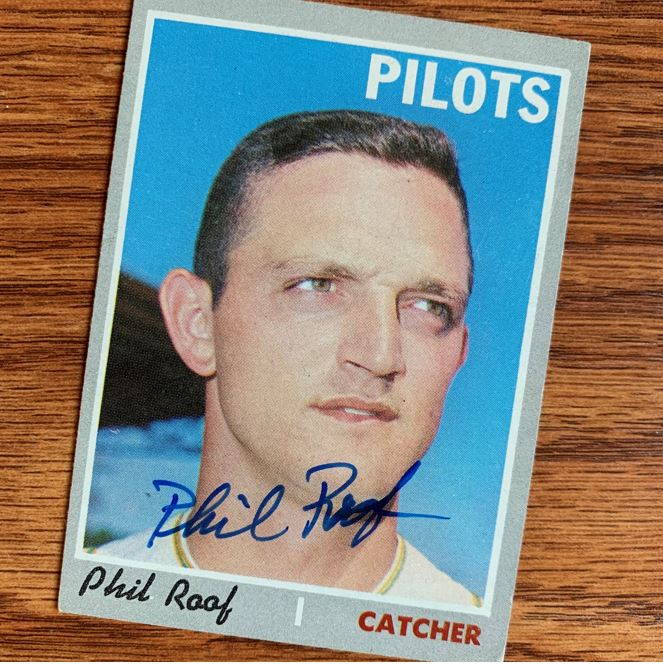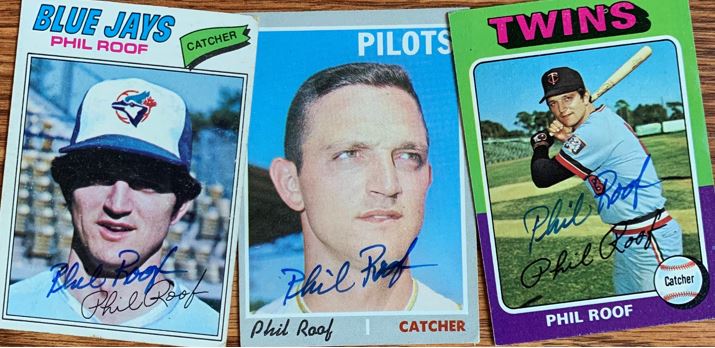
TTM Stats
- Sent: 4/16/2022 | Received: 4/25/2022 | 9 Days
- ’70 Topps, ’75 Topps, ’77 Topps
- Address: Home (address from Sports Card Forum)
The Story of the Autograph
Phil Roof’s name may not immediately bring to mind towering home runs or MVP awards, but for baseball enthusiasts, he’s a celebrated figure who embodies the grit, versatility, and heart that define the sport. Known for his resilience, defense, and mentorship, Roof carved out a lengthy career in Major League Baseball, playing for multiple teams across a span of 15 seasons. His journey, however, extended far beyond his days on the field, as he found new ways to contribute to the game he loved.
Born on March 5, 1941, in Paducah, Kentucky, Phillip Anthony Roof grew up with a passion for sports. He excelled in baseball from a young age, and his talents as a catcher quickly caught the attention of scouts. Signed by the Milwaukee Braves in 1959 as an amateur free agent, Roof’s professional career began in the minor leagues, where he honed his skills and earned a reputation as a reliable backstop.
Roof made his MLB debut on April 29, 1961, with the Milwaukee Braves, but it would take several years and a few team changes before he found his footing in the majors. After stints with the Milwaukee Braves, Los Angeles Angels, and Cleveland Indians, Roof joined the Kansas City Athletics via trade after 1965 season, and he started to gain regular playing time. Although he wasn’t known for his hitting, he contributed significantly with his defense and game-calling ability. His knowledge of the game, strong arm, and quick reflexes made him a valuable asset behind the plate.
Roof’s career took him to eight different teams over 15 seasons, including notable stretches with the Kansas City / Oakland Athletics, Minnesota Twins, and Milwaukee Brewers. As a journeyman catcher, he adapted to the demands of each team, becoming an invaluable backup for pitchers and a reliable defensive presence. While Roof’s batting average was .215 for his career, his contributions went far beyond the box score. His adaptability and focus on defense allowed him to prolong his career and gain the respect of teammates and coaches alike.
His longest and most stable tenure came with the Minnesota Twins, where he played from 1971 to 1976. During these years, Roof’s leadership skills truly shined. He became a mentor to younger pitchers and fellow catchers, and his quiet guidance was integral to the team’s clubhouse culture.
Beyond his work behind the plate, Roof was recognized for his ability to communicate with and guide his teammates, skills that would later serve him well in coaching. Although he didn’t accumulate impressive offensive statistics, he was known for his knack for understanding the game. By the time he retired as a player in 1977, Roof had become widely respected as a catcher who brought immense value to every team he played for, often likened to an unofficial coach even while on the active roster.
After retiring, Roof smoothly transitioned into a coaching and managerial role. He worked with several organizations, including the Minnesota Twins, Oakland Athletics, and Chicago Cubs, sharing his knowledge of the game and shaping the careers of young players. He managed in the minor leagues, where his leadership and mentorship earned him a reputation as a coach who genuinely cared about his players’ growth and well-being. Roof became known as someone who could bring out the best in others, particularly young catchers who benefited from his wealth of experience and insight.
Roof’s contributions as a manager and coach made him a fixture in the baseball world for many years after his playing career ended. His dedication to nurturing talent and fostering teamwork highlighted the qualities that had defined him as a player, and he became a beloved figure in the baseball community.
Phil Roof may not have been a household name, but his impact on the game was profound. His commitment to his role, humility, and steady presence made him a valuable teammate and mentor. Over the years, Roof’s career has served as a reminder that success in baseball—and in life—isn’t always about personal accolades but about contributing to a larger purpose. His longevity in professional baseball is a testament to his character and work ethic, qualities that won him the admiration of players, coaches, and fans alike.
In retirement, Roof has remained connected to the game through various community and alumni events. He’s often looked back on his career with gratitude, appreciative of the opportunities baseball provided and the friendships he forged. His story resonates with many as an example of resilience and dedication, a journey that underscores the less glamorous but deeply meaningful side of professional sports.
The Score on Phil Roof – 6.5


I think Phil gives us a really good example of a marker going with a signature. If he used a big, thick marker on this one and his signature was the same size it would just be a blob of ink. He might have to sign it bigger into or show some definition. Now while I like a big signature, this is his style. These all came out great and I especially like his placement of the autographs on the cards with the facsimile signature.
Thanks Mr. Roof! I;m giving this return a 6.5.

>>> READ MORE ABOUT MY AUTOGRAPH SCORING SYSTEM <<<
Thanks for visiting BravestarrCards.com: Card Collecting and TTM Autographs.
Information gathered using Wikipedia and Baseball Reference.